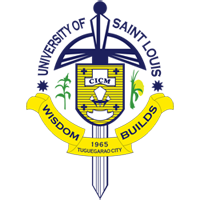
The paper entitled: “Local Knowledge Promotion in Higher Education: The University of Saint Louis Experience” by Rev. Fr. Renillo H. Sta. Ana, CICM, Dr. Emmanuel James P. Pattaguan, and Dr. Darin Jan C. Tindowen was presented at the AUDRN (Asian University Digital Resource Network) National Conference in Silliman University, Dumaguete City, Feb. 8-9, 2019.
The research deals on the University of Saint Louis’ (USL’s) initiatives towards local knowledge promotion and preservation as part of the major research agenda of the University through the Center for Social Innovation, Local Knowledge and Educational Research (CSILKER).
The presentation first cast light on the efforts of the Congregation of the Immaculate Heart of Mary (CICM), the congregation that founded USL, and of its early missionaries towards local knowledge promotion.
CICM apostolate
One of CICM-Philippines’ mission priorities and projects is IP Concerns. “CICM-Philippines is tasked to promote the apostolate to the IP. This is an integral part of the missionary commitment of the congregation,” noted by Rev. Fr. Sta. Ana.
Programs are implemented in CICM parishes and schools. There are centers established in schools that give emphasis on IP.
CICM missionaries are known to document cultures and languages especially in Northern Philippines. Among the CICM missionaries in the Philippines, Rev. Fr. Francis Hubert Lambrecht is known internationally for his works on Ifugao culture.

Fr. Lambrecht published more than 70 original papers on Ifugao which include its language, sagas (hudhud), songs, religion and rituals, world view, technology and art, and socio-political systems and institutions. Many of his field notes and manuscripts have remained to be published after his demise.
Rev. Fr. Morice Vanoverberg also established himself as an authority on Ilokano, Kankanay, and Isneg language and culture. His works were on grammar, lexicography (dictionary and thesaurus), folk literature, history, ethnography, and cultural anthropology. His main work was on the publication of a book on the original language of the Negritos of Casiguran.
Other prominent CICM missionaries whose passion is on indigenous studies and local knowledge are Rev. Fr. Francisco Billet, CICM on Kalinga Ullalim and Ifugao Orthography; Rev. Fr. Henry Geeroms, CICM on Ilokano, Ibalaoi, and Kankanaey; Rev. Fr. George Gelade, CICM on Ilokano dictionary; Rev. Fr. Alfonso Claerhoudt, CICM on Igorot songs; Rev. Fr. Jerome Moerman on Ifugao tales and songs; and Rev. Fr. Godfrey Lambrecht on Gaddang rites and religion.
Instruction
Local knowledge promotion is integrated in CHED-mandated general education courses in the undergraduate level such as History, Literature, and Humanities.
The presentation noted the inclusion of Teaching Indigenous Peoples, a professional course in the Teacher Education program. As an outcome in the course, pre-service teachers do service-learning programs to Aeta students in a community in Peñablanca, Cagayan.
In the graduate level, local knowledge is emphasized in the following programs: Master of Arts in Teaching and Master of Arts in Education major in Social Studies, and Master of Arts in Education major in Biological Studies.
Research
The University publishes annually the Bannag: A Journal of Local Knowledge through print and online platform at http://oldwebsite.usl.edu.ph/bannag/.
The journal is published in the Philippines but accepts articles from authors all around the globe. Published by USL under the management of the CSILKER, it focuses on the results of original research projects on Culture and the Arts, Indigenous Studies, Anthropology, Indigenous Politics and Governance, and other related fields.
The University, through the Center, also submits papers on local knowledge to different international peer reviewed and ISI/SI indexed journals.
Furthermore, research conferences on local knowledge and indigenous studies are held in the University annually.

First International Research Conference on Local Knowledge and Indigenous Studies
Under the research agenda on Cagayano Development, studies by students and faculty were conducted to document different cultural resources of Cagayan such as dances, music, arts, indigenous systems and beliefs, and language and literature. Some of these studies were presented in local and international research conferences.
Drawing support from government and non-government organizations, the University works with the Commission on Higher Education (CHED) and the National Commission on Culture and the Arts (NCCA) in the conduct of three creative research grants funded by the said agencies.
These researches focus on documentation and promotion of cultural resources and indigenous beliefs of the Aetas of the provinces of Quirino, Isabela, and Cagayan; the Ybanags of Isabela and Cagayan; and the Malauegs of Rizal, Cagayan.
USL is also being supported by the National Commission on Indigenous Peoples (NCIP) and the Department of Education (DepEd).
Aside from said partnerships, USL is a member of the Asian University Digital Resource Network (AUDRN), an educational network in Asia for the promotion of local knowledge and expansion of relevant digital and critical literacy, and the National Coalition of Indigenous Peoples in Higher Education (NiChE) which aims to promote diversity and culture among indigenous peoples. Currently, USL is the Luzon cluster head of the NiChE.
USL also forged partnership with the International Multicultural Network (IMN) – Azerbaijan, having been the main partner of USL in the conduct of the 1st International Research Conference on Local Knowledge and Indigenous Studies last Oct. 24-27, 2018.
Extension and other initiatives
Through the Community Engagement and CICM Advocacies Office (CECAO) and the academic departments, extension and outreach activities such as literacy programs, medical and dental services, and livelihood training programs are conducted to different indigenous cultural groups in the province especially to the Aetas of Peñablanca, Cagayan, and to different tribes in Kalinga province.
Other local knowledge promotion activities of the University are initiated by its Center for Culture and the Arts (CCA), the United Cordillera Student Cultural Organization (UCSCO)-USL chapter, and by the University Libraries.

